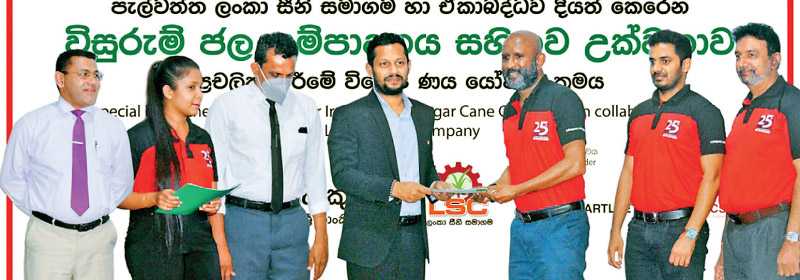Monday Feb 23, 2026
Monday Feb 23, 2026
Thursday, 22 April 2021 00:14 - - {{hitsCtrl.values.hits}}

PABC Senior DGM Naleen Edirisinghe is seen exchanging the MoU with LSCPL Chairman Janaka Nimalachandra, LSCPL COO Rtd. Major Vajira Kumaratunge and LSCPL CEO/Director Gamini Rasaputhra. PABC Senior Dealer Kuganeshwaran Sabapathy and PABC Manager – Development Banking Division Ranjith Atukorala are also in the picture
As the truly Sri Lankan bank, Pan Asia Bank (PABC) has played a pivotal role in promoting the sustainable development of the local economy – with a special emphasis on supporting SMEs engaged in agriculture and related industries, partnering both governmental and non-governmental organisations to further deepen its impact.
In line with this goal, PABC launched another special financing project through its Monaragala Branch to benefit the local sugarcane farming community by way of sprinkler irrigation technology for enhancing the local sugar production. The inaugural ceremony of this project was held recently in collaboration with the Lanka Sugar Company (LSCPL) at Pelwatte Sugar Company Auditorium. PABC Chairman/CEO, senior operations staff, including the COO, Senior Deputy General Manager and PABC - Monaragala staff were present on the occasion. Bartleet (BPML) CEO and Agricultural and Agrarian Insurance Board (AAIB) Chairman and Director-General were also present at the event. Heads of Government and Non-Government organisations in the area also attended. This special project by PABC in association with LSCPL will go a long way in achieving the targets of local sugar production and will directly contribute to the strengthening of the economy of the sugarcane farming community. The first phase of this project is to popularise sugarcane cultivation with sprinkler irrigation, which will cover an area of about 1,000 hectares; additionally, the number of farming families receiving relief will be around 500. PABC extended loan benefits for the purchase of sprinkler water equipment to 65 selected farming families to commence the project. A field trip was also organised on the day to see how these types of equipment are incorporated in the field.
PABC will also provide technical consultation and sprinkler water kits with a 10-year warranty through BPML and special coverage for sugarcane cultivation through the AAIB. PABC, LSCPL, and BPML have recently signed a Memorandum of Understanding (MoU) in this regard recently. PABC CEO/Managing Director, Nimal Tillekeratne; LSCPL Chairman Janaka Nimalachandra and BPML CEO Derrick Marks signed the agreement.
Annual rainfall is a constraining factor in the Monaragala District, which is known as a dry agro-climatic zone. According to a survey conducted in collaboration with Hector Kobbekaduwa and the Agrarian Research and Training Institute, systematic irrigation of sugarcane can double the final yield. Accordingly, the Development Banking Division of PABC has taken steps to introduce a special concessionary loan scheme focusing on directing farmers to new technological water supply strategies, and providing high-quality equipment.
In addition to providing basic facilities by introducing various loan schemes for various sectors, guiding new entrepreneurs, providing necessary training and technical services, accounting and marketing are some of the important services that PABC provides for a sustainable impact. Its sustainable approach is focused on uplifting remote villages in order to enrich the rural economy through its wide branch network.
The bank’s green financing efforts have led it to be awarded ‘Best Green Bank for 2020 in Sri Lanka’ by the International Global Finance Magazine for its eco-friendly financial contribution to a prosperous green tomorrow by utilising natural resources more efficiently. As the truly Sri Lankan bank, PABC’s ambition is to contribute to the country in the future with this Public-Private Partnership (PPP) green loan project, ensuring the prosperity of future generations.